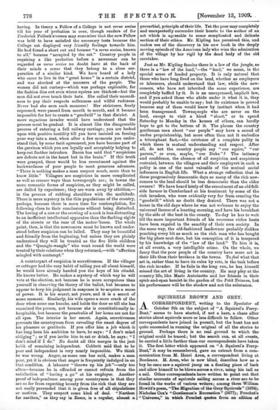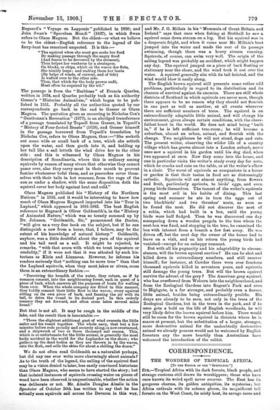SQUIRRELS BROWN AND GREY.
ACORRESPONDENT, writing to. the Spectator of October 9th on the subject of " A Squirrel's Ferry- Boat," seems to have started, if not a hare, a chase after stories about squirrels more or less difficult to follow. Other correspondents have joined in pursuit, but the hunt has not quite succeeded in running the original of all the stories to ground. Perhaps there is no real ground to which the original could be traced ; but the search can, at all events, be carried a little further than our correspondents have taken it. The first letter which appeared on " A Squirrels Ferry- Boat," it may be remembered, gave an extract from a com- munication from M. Henri Area, a correspondent living at Bordeaux. IL Amu, who is now blind, describes how as a boy he once saw a squirrel jump on a floating piece of bark and allow himself to be blown across a river, using his tail as a sail. Other.correspondents have written to point out that similar accounts of squirrels sailing across a river are to be found in the works of various writers; among them William Howitt's poem, "That Migration of the Grey Squirrels" (1834); Nicholas Coxes "Gentleman's Recreation" (1677); Pouchet's " Universe," in which Pouchet quatea from an edition Of
Begnard's " Voyage en Lapposie " published in 1820; and John Swan's " Speculum Mundi" (1637), in which Swan refers to Olaus Magnus. But the oldest—or what we believe to be the oldest—English reference to the legend of the ferry-boat has remained unquoted. It is this :—
"The squirrel when she must goe seeke her food By making passage through the angry flood (And feares to be devoured by the streame), Thus helpes her weakness by a stratagem. On blocks, or chips, which on the waves doe flote, She nimbly leaps : and making them her boats (By helpe of winds, of current, and of tide) Is wafted over to the other side.
Thus, that which for the body proves unfit, Must often be acquired by the wit."
The passage is from the " Emblems " of Francis Quarles, written in 1634, and Quarles probably took as his authority Gesner's " Historiae Animalium," which began to be pub- lished in 1551. Probably all the authorities quoted by our correspondents go back in the end to Gesner or Olaus Magnus. The quotation given as occurring in Nicholas Cox's "Gentleman's Recreation" (1677), is an abridged transference of a passage translated by Topsell from Gesner, in Topsell's " History of Four-footed Beasts " (1658), and Gesner himself in the passage borrowed from Topsell's translation by Nicholas Cox, refers to Glans Magnus, thus :—" She seeketh out some wide or small bark of a tree, which she setteth upon the water, and then goeth into it, and holding up her tail like a sail letteth the wind drive her to the other side : and this is witnessed by Olaus Magnus in his description of Scandinavia, where this is ordinary among squirrels by reason of many rivers that otherwise they cannot passe over, also they carry meat in their mouth to prevent famine whatsoever befal them, and as peacockes cover them- selves with their tails in hot summer, from the rage of the sun as under a shadow, with the same disposition doth the squirrel cover her body against heat and cold."
Olaus Magnus published his " History of the Northern Nations " in 1555, and it would be interesting to know how much of Olaus Magnus Regnard imported into his " Tour in Lapland," which appeared in 1681-1682. The best English reference to Regnard is Oliver Goldsmith's, in the "History of Animated Nature," which was so tersely summed up by Dr. Johnson. "Goldsmith, Sir," pronounced the Doctor, " will give us a very fine book on the subject, but if he can distinguish a cow from a horse, that, I believe, may be the extent of his knowledge of natural history." Goldsmith, anyhow, was a little doubtful about the yarn of the squirrel and his tail used as a sail. It might be rejected, he remarks, " with that scorn with which we treat imposture or credulity," if it were not that it was attested by such his- torians as Klein and Linnaeus. However, he informs his readers seriously that " nothing can be more true " than that the Lapland squirrels, when they meet lakes or rivers, cross them in an extraordinary fashion :—
" Perceiving the breadth of the water, they return, as if by common consent, into the neighbouring forest, each in quest of a piece of bark, which answers all the purposes of boats for wafting them over. When the whole company are fitted in this manner, they boldly commit their little fleet to the waves ; every squirrel sitting on its own piece of bark, and fanning the air with its tail, to drive the vessel to its desired port. In this orderly manner they set forward, and often cross lakes several miles broad."
But that is not all. It may be rough in the middle of the lake, and the result then is lamentable :-
"There the slightest additional gust of wind oversets the little sailor and his vessel together. The whole navy, that but a few minutes before rode proudly and securely along, is now overturned, and a shipwreck of two or three thousand sail ensues. This, which is so unfortunate for the little animal, is generally the most lucky accident in the world for the Laplander on the shore ; who gathers up the dead bodies as they are thrown in by the waves, eats the flesh, and sells the skins for about a. shilling the dozen."
We do not often read Goldsmith as a naturalist perhaps, but did any one ever write more charmingly about animals P As to the truth of the legend, the sailing of the squirrel fleet may be a vision denied to later, less easily convinced historians than Olaus Magnus, who seems to have started the story; but that isolated instances of squirrels crossing water on pieces of wood have been observed is unquestionable, whether the action was deliberate or not. Mr. .Ainslie Douglas Ainslie in the Spectator of October 30th has written to say that he has actually seen squirrels sail across the Deveron in this way,
and Mr. J. G. Millais in his "Mammals of Great Britain and Ireland" says that once when fishing at Stohhall he saw a squirrel come down stream on a log. But his squirrel was in a desperate fright, and when it came near Mr. Millais's boat jumped into the water and made the rest of its passage swimming, though there was a heavy stream running. Squirrels, of course, can swim very well. The origin of the sailing legend was probably an accident, which might happen any day. The squirrel jumped on a piece of bark floating or stationary near the shore, and the wind took it out over the water. A squirrel generally sits with its tail hoisted, and the wind would blow it easily along,
The English brown squirrel still presents some rather odd problems, particularly in regard to its distribution and its chances of survival against its enemies. There are still whole districts of Scotland in which squirrels are never seen, though there appears to be no reason why they should not flourish in one part as well as another, at all events wherever there are sufficient numbers of trees. The squirrel is an extraordinarily adaptable little animal, and will change his environment, given always certain conditions, with the cheer- fullest heart in the world. He does not mind being " built in," if he is left sufficient tree-room ; he will become a suburban, almost an urban, animal, and flourish with the change. Two neighbours he will not stand, dogs and cats. The present writer, observing the wilder life of a country village which has grown almost into a London suburb, never once saw a squirrel in his garden until his dog died, when two appeared at once. Now they come into the house, and one in particular visits the writer's study every day for nuts, which he cracks and eats on the table, or at the writer's elbow in a chair. The worst of squirrels as companions in a house or garden is that their tastes in food are so distressingly catholic. Squirrels will eat almost anything, from flowers and fruit, particularly apricots, to birds' eggs, and even young birds themselves. The tamest of the writer's squirrels is the most evil in his habits of dining. This last spring and summer he ate in turn the eggs out of two blackbirds' and two thrushes' nests, as soon as he found the nest. He did not discover the nest of a robin, which had built in a box, until the young birds were half fledged. Then he was discovered one day scampering down a wooden pergola to the tree where the nest-box was fixed, and stopping in the tree, he examined the box with interest from a branch a few feet away. He was driven off, but the next day the owner of the house bad to leave on a visit, and on his return the young birds had vanished—except for an unhappy remnant.
But with all his pugnacity and his adaptability to circum- stances, will the brown squirrel survive P He can be shot and killed down in extraordinary numbers, and still recover himself ; for instance, at Cawdor there were over fourteen thousand squirrels killed in seventeen years, and squirrels still damage the young trees. But will the brown squirrel survive the advent of the grey ? The American grey squirrel, who has overflowed from Woburn into the neighbourhood, and from the Zoological Gardens into Regent's Park and even to Highgate, is a far stronger, and probably even a fiercer, little animal, besides being extraordinarily prolific. His dreys are already to be seen, not only in the trees of the Zoological Gardens, but in the trees in the park, and if be
once gets a bold on the life of English woodlands, he will very likely drive the brown squirrel before him. There would still be room for the brown squirrel in districts where he is scarce at present, but the substitution of a larger, stronger, more destructive animal for the undoubtedly destructive animal we already possess would not be welcomed by English foresters any the more heartily than Australians have welcomed the introduction of the rabbit.















































 Previous page
Previous page